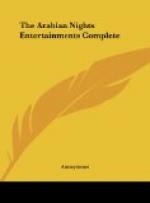As the fairy Perie Banou pronounced the last words with a different tone, and looked at the same time tenderly at the prince, with downcast eyes and a modest blush upon her cheeks, it was not difficult for him to comprehend what happiness she meant. He reflected that the princess Nouronnihar could never be his, saw that Perie Banou excelled her infinitely in beauty and accomplishments, and, as far as he could conjecture by the magnificence of the palace, in immense riches. He blessed the moment that he thought of seeking after his arrow a second time, and yielding to his inclination, which drew him towards the new objeft which had fired his heart: he then replied, “Should I, all my life, have the happiness of being your slave, and the admirer of the many charms which ravish my soul, I should think myself the happiest of men. Pardon the presumption which inspires me to ask this favour, and do not refuse to admit into your court a prince who is entirely devoted to you.”
“Prince,” answered the fairy, “as I have been, long my own mistress, and have no dependence on a parent’s consent, it is not as a slave that I would admit you into my court, but as master of my person, and all that belongs to me, by pledging your faith to me, and taking me as your wife. I hope you will not think it indecorous, that I anticipate you in this proposal. I am, as I said, mistress of my will; and must add, that the same customs are not observed among fairies as with human-kind, in whom it would not have been decent to have made such advances: but it is what we do, and we suppose we confer obligation by the practice.”




